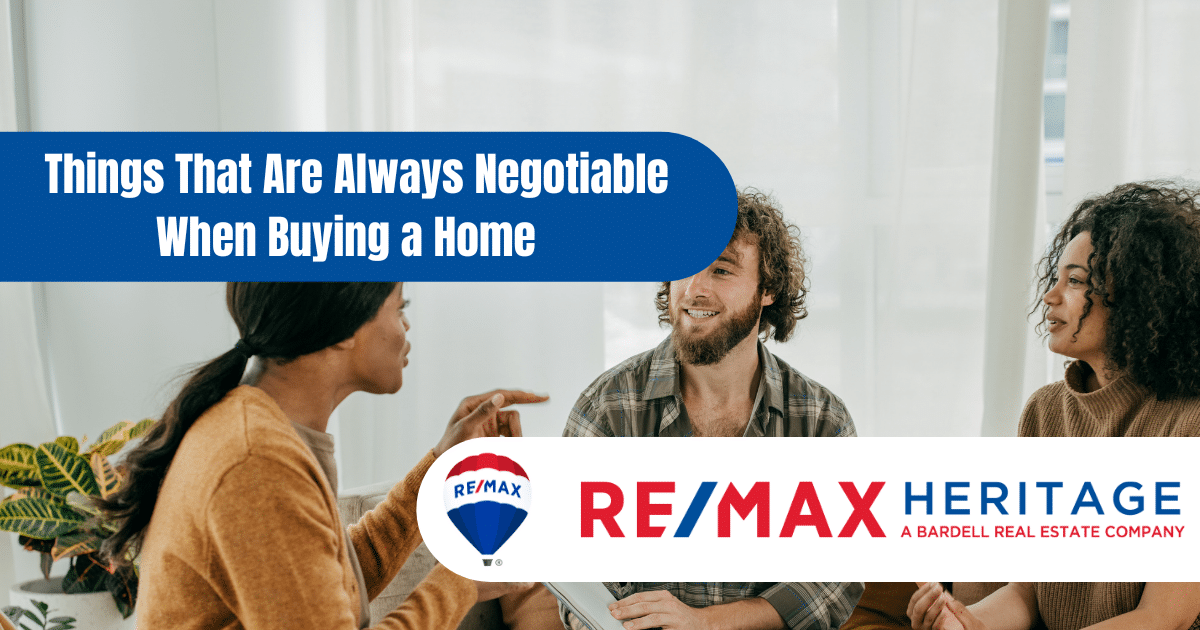Things That Are Always Negotiable When Buying a Home


Things That Are Always Negotiable When Buying a Home
Whether you’re a homebuyer or a home seller, at some point in the process, you’ll find yourself playing the role of a home negotiator.
Real estate transactions are all about give and take, with both parties wanting and needing to bargain to seal the deal. But hey, even in a seller’s market, you might be wondering if you can still haggle for a better deal as a buyer.
So, what’s on the negotiation table? Well, practically everything in the real estate world can be up for grabs. We even heard this wild story where someone tried to throw in their horse as part of the deal (crazy, right?). But hey, we’re not horsing around here! Let’s dive into four common things you can flex your negotiation skills on when buying a home.
1. The price of the house
Now, it’s pretty obvious, but we can’t talk about real estate negotiation without emphasizing that the price of a home sale is ultimately a matter of personal judgment. The final selling price that both the buyer and seller settle on is influenced by the forces of supply and demand.
The price of a home is totally up for negotiation. Your local agent can be your trusty guide in this. If homes are flying off the market, that’s a sign that there might not be much flexibility. However, if a home lingers on the market for a while, you’ll definitely have more room to work your negotiation magic
2. Earnest money deposit
An earnest money deposit is the real deal when it comes to showcasing a buyer’s sincerity. It’s a good-faith deposit that accompanies the buyer’s offer, and if they decide to back out without a good reason, they kiss that deposit goodbye.
To really amp up their offer, some savvy homebuyers choose to up the ante with their deposit, proving to the seller that they mean serious business. For instance, let’s say the purchase agreement states an offer price of $100,000, and the buyer decides to put down a $1,000 earnest money deposit as a way to show their commitment.
Now, it’s important to note that earnest money is not the same as a down payment. A down payment is strictly designated for the mortgage, while earnest money is a deposit that gets credited to the buyer upon closing. It’s not an extra fee or anything like that.
If you’re feeling bold, negotiating the amount of earnest money you’re willing to throw into the mix is a clever bargaining tactic definitely worth giving a shot.
3. “Money” back at closing
Understanding the concept of getting “money” back at closing can be a bit tricky, but let’s simplify it. It’s a way for buyers to have a little extra cash in hand during the homebuying process by receiving assistance from the sellers to offset closing costs. Now, don’t get me wrong—you won’t actually receive cash directly from the seller. Instead, the seller provides funds that ultimately leave you with more money in your pocket.
To shed some light on this negotiation technique, let’s consider an example:
Imagine you’ve found a home you love priced at $500,000. If you plan to make a 20% down payment ($100,000) and allocate 5% for closing costs ($25,000), you’ll need $125,000 in cash. Let’s say you have $145,000 in your savings account. After closing on the home, you would have $20,000 left over.
Now, let’s explore a scenario where you want even more cash for unexpected expenses and daily living. You could offer to pay $510,000 for the house and request $10,000 back in cash.
In this case, the down payment and closing costs would increase slightly (to $127,500). However, if the seller agrees and the home is appraised at the higher price, you would have an extra $10,000 available for closing costs. Consequently, you’d have $27,500 remaining after the purchase instead of the $20,000 in the original scenario.
In that example, the home seller still receives the same amount—they walk away with $500,000,” explains Hale. “And the additional cash funds provide you, as the buyer, with more upfront money to use immediately, which can be beneficial since purchasing a home requires a significant amount of cash, even with financing involved.
4. Mortgage rate and closing costs
This crucial negotiation usually takes place between you and a mortgage broker, and its outcome can have a significant impact on your ability to buy a home.
When a homebuyer is seeking approval from a lender, it’s essential to ask the right questions. Questions like why a specific interest rate was offered or how much the closing costs amount to.
Different lenders not only offer various program options but also different rates for the same programs. That’s why it’s wise to speak with at least two lenders, seeking a second opinion and the opportunity to negotiate for the best rate.
In certain cases, buyers may be able to have some of the closing costs covered by the seller, known as concessions. However, this type of negotiation is more likely to occur in a buyers’ market.
Experts in Residential Real Estate in Orlando
If you are BUYING or SELLING real estate it’s quiet often the single most important financial decision you make. For the last 30 years we have helped clients buying and selling property in Orlando and the surrounding areas. Put simply, this means the knowledge and expertise accumulated over this time ensures our clients get the best representation possible.
Our experienced agents will help and guide you through the entire process providing valuable support every step of the way.
Ready to make a Move?
Bardell Real Estate are the experts in helping you with your selling, buying or renting needs near Orlando, Florida. Make your Disney area experience a forever memorable one. Call us now to speak to a real estate agent.
[formlift id=”36911″]
